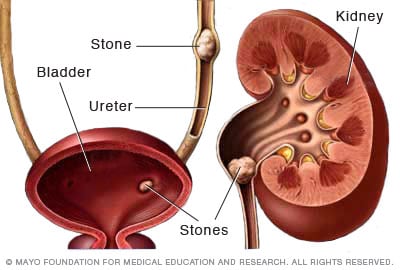Understanding the Distinctions Between Kidney Stones vs UTI: Key Signs and Treatments
Understanding the Distinctions Between Kidney Stones vs UTI: Key Signs and Treatments
Blog Article
Discovering the Manifestations and Causes of Kidney Stones in Contrast to Urinary Tract Infections: A Comprehensive Overview
The exploration of kidney rocks and urinary system tract infections (UTIs) reveals a complex interplay of symptoms and underlying causes that warrant careful assessment. While both problems can cause hematuria, they offer distinctive clinical features and develop from various etiological factors. Comprehending the subtleties of each problem is crucial for effective diagnosis and monitoring. What are the crucial distinctions in their signs and symptoms, and just how might these inform therapy methods? The responses to these inquiries may provide important understandings right into the prevention and treatment of these common urological problems.
Review of Kidney Stones
Kidney rocks, additionally referred to as kidney calculi, kind when specific substances in the pee crystallize and accumulation, causing the development of difficult deposits within the kidneys. These rocks can differ in dimension, varying from a grain of sand to a golf sphere, and can be composed of numerous materials, one of the most typical being calcium oxalate, uric acid, struvite, and cystine. The formation of kidney rocks is influenced by numerous factors, including dietary routines, liquid intake, and hereditary tendency.
Signs of kidney stones may include serious discomfort in the back or side, blood in the pee, nausea, and frequent urination, particularly as the rock moves with the urinary tract. Medical diagnosis generally includes imaging researches such as ultrasound or CT scans, alongside urinalysis to identify the stone's make-up.
Treatment options vary based upon the size and kind of rock, along with the intensity of symptoms (Kidney Stones vs UTI). Small rocks might pass normally with enhanced fluid intake, while larger stones might call for clinical interventions such as lithotripsy or medical removal. Recognizing the pathophysiology and danger factors connected with kidney rocks is necessary for effective avoidance and monitoring
Introduction of Urinary Tract Infections
Urinary system tract infections (UTIs) are usual bacterial infections that impact any kind of part of the urinary system, consisting of the kidneys, ureters, bladder, and urethra. They predominantly happen when germs, often from the gastrointestinal tract, enter the urinary system, leading to swelling and infection.
The frequency of UTIs is especially greater in females than men, primarily as a result of physiological differences, such as a shorter urethra. Risk elements include sex, specific contraceptive approaches, urinary system retention, and dehydration. The medical diagnosis of UTIs is generally validated through pee examinations, which may expose the visibility of bacteria, white blood cells, or red cell.

Signs And Symptoms of Kidney Stones
The pain related to kidney stones can show up in numerous methods, often leading individuals to look for clinical attention. Among one of the most common signs is severe discomfort, generally local in the lower back or side, which might radiate to the abdominal area or groin. This pain, often described as sharp or cramping, can take place all of a sudden and may rise and fall in strength.
Additionally, people may experience hematuria, or blood in the urine, which can range from tiny quantities to noticeable staining. This sign may be gone along with by changes in urinary system behaviors, such as raised regularity or necessity, along with discomfort throughout peeing. Queasiness and vomiting are additionally prevalent, commonly resulting from the body's reaction to extreme pain.
In many cases, individuals might experience fever and cools, specifically if an additional infection creates because of the obstruction triggered by the rocks. In general, the mix of severe pain, hematuria, transformed urinary system patterns, and stomach symptoms can supply substantial understanding into the visibility of kidney stones, calling for prompt medical analysis and intervention. Recognizing these signs is important for timely diagnosis and efficient monitoring of the problem.
Signs And Symptoms of Urinary System Tract Infections
Infections within the urinary tract commonly present a variety of unique signs and symptoms that can substantially influence every day life. The most usual symptoms consist of a relentless impulse to urinate, usually come with by a burning feeling throughout urination, called dysuria. People might likewise experience enhanced regularity of peeing, generating percentages of pee each time.
Various other remarkable signs and symptoms include over cast or reeky pee, which might suggest the presence of microorganisms or pus. Sometimes, urine may appear pink or red because of the visibility of blood, a problem called hematuria. Additionally, people might experience pelvic discomfort or pressure, which can further worsen the sensation of urgency.
Systemic signs might likewise manifest, such as fever, cools, and fatigue, especially if the infection has actually risen to the kidneys. It is vital to acknowledge these signs over here early, as without treatment urinary system system infections can result in more extreme problems. Kidney Stones vs UTI. Trigger medical attention is suggested when these signs are observed, enabling ideal analysis assessment and therapy to ease pain and avoid more health and wellness issues
Causes of Each Condition
Often, kidney stones and urinary system tract infections develop from distinctive yet often overlapping causes that can impact people in different ways. Kidney rocks generally develop due to metabolic aspects, nutritional choices, and genetic predispositions. Boosted levels of calcium, oxalate, or uric acid in the urine can result in rock development. Dehydration, inadequate liquid intake, and high-sodium diets can worsen these conditions, advertising formation within the urinary system.

Understanding these unique reasons is essential for avoidance and treatment. Kidney Stones vs UTI. While way of living adjustments may minimize the threat of kidney rocks, proper hygiene and prompt treatment of urinary system system infections are vital for decreasing their reoccurrence and connected issues
Final Thought
In recap, kidney stones and urinary system infections present distinctive symptoms and underlying reasons. Kidney rocks are defined by serious pain and metabolic elements, while urinary system infections mainly include bacterial infections causing urinary system seriousness and discomfort. Both problems can result in hematuria, their formation systems vary considerably. Comprehending these distinctions is essential for reliable medical diagnosis and therapy, eventually enhancing client outcomes for those influenced by either problem.
The expedition of kidney rocks and urinary system have a peek at this site infections (UTIs) reveals a complex interplay of signs and underlying causes that require mindful examination.Urinary system tract infections (UTIs) are common bacterial infections that impact any kind of component of the urinary system, consisting of the kidneys, ureters, bladder, and urethra.Frequently, kidney rocks and urinary system system infections arise from unique yet sometimes overlapping causes that can affect individuals differently.In recap, kidney rocks and urinary system you can look here tract infections present distinct signs and underlying reasons. Kidney stones are characterized by extreme discomfort and metabolic variables, while urinary system infections mainly involve microbial infections leading to urinary system necessity and pain.
Report this page